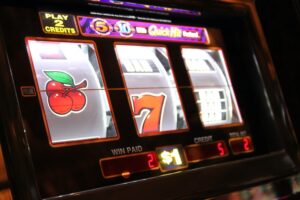How Slot machines work
 Approximately 240 billion dollars are contributed to the U.S. financial system by the gaming industry, generating revenue of $38 billion and creating seventeen million jobs. Most people don’t realize that slot games, video poker gadgets, and other gaming appliances account for the majority of the economic activity. As a result, they have grown so much in popularity and influence across the globe.
Approximately 240 billion dollars are contributed to the U.S. financial system by the gaming industry, generating revenue of $38 billion and creating seventeen million jobs. Most people don’t realize that slot games, video poker gadgets, and other gaming appliances account for the majority of the economic activity. As a result, they have grown so much in popularity and influence across the globe.
These devices have led to 89 per cent of total gaming revenue at popular casinos. For casinos, slots are the main source of profit, doing better than blackjack, video poker machines and other gambling forms.
For most casinos, spinning-reel slots are the main source of profit, doing better than video poker machines, blackjack and other gambling forms. This is why we’re going to be discussing slot machines and how they work.
Considering that we already know what slot machines are and the features they come with, how does it work? Here is a breakdown of how slot machines work?
How do Slot Machines work?
The Price of a Slot
The thing about slot machines that make them reliable is their ability to fix the price and hide the original price from the players. The theory of demand and supply states that a price rise reduces demand. Nevertheless, price transparency exists for the vast majority of stakes we make every day. Aside from doctor’s visits and probably auto mechanics, we usually know the cost of products before we purchase them.
In a way, slot machines are worse than doctors’ offices, in that we can never figure out the value of wagers. Thus, supply and demand do not work with slots which means supply and demand do not work with slots.
Casino operators imagine price to be the average advantage on every stake placed. Essentially, it is a long-term advantage of each bet placed that determines the price of a slot. Depending on the amount of interaction an individual has with the game, the price may look different for each of those players.
Look at this: imagine a game with a house advantage of 10 per cent. In other words, the slot will pay back 10 per cent of all the wagers accepted to the management over the long run. As a result, if the casino accepts $1 million wagers in over 2 million spins, it would pay out $900,000, which gives the casino a $100,000 gain. The management of the casino expects to make 10% of what the gamblers pay overtime as charges for its services.
Players may think the spin cost is the price they pay. So if they stake $10 on a slot, play around and don’t get any payout, they feel that’s what the casino collects. However, despite collecting money from the player, casino operators know that some percentage will be refunded to the other players
In any event, a player would not know this since they will be playing for a short period where they hope to regain their losses. At this rate, it would take years to recognize the long-term advantage of playing slot games. Yet, it is worth stressing that BonusCodePoker.com offer all sorts of bonuses to encourage their players.
Difference in views between player and casino owner
The differences in price are rooted in the short-termand the long-term thinking of the players and management. If you play games at an online casino, there are three outcomes, you hit jackpot and win big, you lose everything, or you lose a bit and leave before you lose all funds.
The chances of the second outcome happening are far greater than the others. For the casino to remain on top, players must lose games. This is the reason so many people gamble – if there were no losers, there would be no winnings.
To be precise, putting together all individual losses funds the big jackpots. As a result, many players have to lose their entire bankroll to provide enticing jackpots. However, many people do not realize that experience rarely happens at player level. Such a game would disappoint players if it were typically the slot experience. The only downside is that it will be easy for the player to figure out what price he is paying.
How Casino owners get away with these price fixes
Many operators do not raise the house advantage of their slot machines, believing that players usually know when there are price shocks. The casino, however, has found that increasing the casino advantage has produced significant gains in revenue without being detected by even the savvier players.
Even though their low-priced counterparts were few feet away from the high-priced games, further analysis revealed no evidence of play migration from them. This was achieved even though playing high-priced games was economically disincentive.
Using this knowledge, casino owners can willingly shift their prices to whatever they feel. This is essentially how the slot machine works.
Conclusion
While casino managers want to use all their slot revenue, they do not want to crush players interest by hiking their prices. If players can detect these sudden price increase, they may decide to play somewhere else. This is how the slot machine works and how casinos make their monies of each slot played.